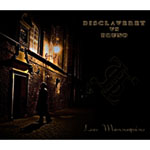
CD, Zoharum, 2007
www.bisclaveret.com
When I initially came across “Les Mannequins” my mind queried its mental database for this unfamiliar artist by the name of Bruno. I’ve heard and enjoyed Bisclaveret in the past, but was curious as to who was their collaborator. Upon inspecting the credits I realized the title was a reference to a fellow Polish writer and artist, Bruno Schulz. While many post-industrial musicians wear their influences on their sleeves and draw from commonly appreciated sources (such as Gibson, Nietzsche, Burroughs, etc.), it’s refreshing to see a direct reference to a writer I may have never come across either by myself or via other musical avenues.
The work of Bruno Schulz is filled with dreamlike imagery and an overwhelming sense of isolation and disconnection. The lyrics for this release are based on the short story “Tractate about Mannequins,” a surreal, metaphysical exploration of the act of creation wherein a father creates a son, who in return creates his father. From here we can see Bisclaveret creating a unique piece out of what has already been written. “Les Mannequins” takes the form of a single track spanning 40 minutes. There isn’t much variation, and the only significant movement is towards the midsection where a certain crescendo is reached and violins gracefully accompany the metallic scrapes, delayed synths, and reverberated spoken prose. The atmosphere fits perfectly with what one would expect of a Schulz painting or novel, so Bisclaveret do their inspiration justice in that sense. The sound is very crisp; every creeping crackle is audible as it pans across your stereo. The broken sounds meld well with the flowing lyrics, which are spoken in their native Polish. While I appreciate the lyrics staying true to the language in which they were written, my own selfishness would have liked a translated text in the packaging. While it may not have been intentional, the cover photograph brings to mind the Drohobycz ghetto in which Schulz was imprisoned in his final years.
Ultimately, I’m left feeling that there should have been more. The lack of variety is a repeated offense by Bisclaveret, which is a shame since the duo has a talent at creating dark soundscapes. I suspect the artists may fear significant dynamics could break the subtle atmosphere. Either way, I would recommend this album to those seeking a little more literary substance to their bleak soundtracks.
[7.5/10]
— Raul A.
